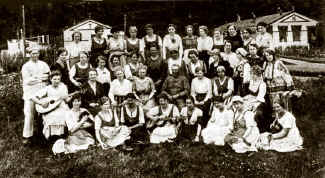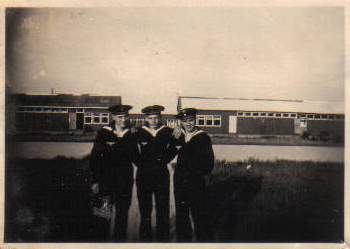|
to
English Camp page
|
The English Camp in Groningen
after the Great War: 1919 - 1958
This is the thirteenth and last part of a series of articles on the history of the English Camp in Groningen, Holland where 1,500 British servicemen were interned during the Great War 1914 – 1918.
 |
“Female Students of Groningen house a number of their Viennese counterparts for seven weeks. They have been put up in the former internment camp of the
British, pleasantly restored. On this picture one can see the Viennese ladies with in their
midst, Lt Col Hogervorst, Commander of the Rabenhauptkazerne.
In the background can be seen hut T, the original housing for the Dutch
guards. Hut K was the British PO cum library. To the left can be seen the guards room which is shown in the picture accompanying article 8 in this series, apparently being pulled down. |
In the immediate aftermath of the war, the English Camp housed repatriated British PoW
from Germany who were ill, and PoW of other nationalities. Afterwards, the buildings and grounds could be used by their owner, the Ministry of War. The English Camp served other purposes in those years. In 1920, the Camp was used to house a number of ‘Viennese Female Students’. A number of sports clubs were housed there for a number of years.
During the 1920s, the English Camp was used as annex to the army base at the Rabenhauptkazerne. Conscripted soldiers were housed there. Huts were arranged as houses for the families of officers. All young men aged 18 or over had to attend their medical in one of the huts in the English Camp. The old huts had deteriorated to such an extent that they were pulled down in 1938. The area has lain derelict for a number of months. In May 1940, the 12th Regiment Infantry, based at the Rabenhauptkazerne was involved in the armed conflict that followed the German invasion. Late in June 1940, this regiment was demobilised in the new huts in the English Camp, which had been built there in the first months of 1940.
 |
Photo
of three German Duitse Kriegsmarine soldiers in the Otto
Weddingenlager as the English Camp was called during the German
occupation of The Netherlands in the second World War.
(Courtesy: Photo from yhe collection of Bjorn Spinder - Bedum) |
The Rabenhauptkazerne housed German occupying forces during the Second World War. In 1941, the
'Otto Weddingenlager' was established on the English Camp, for a department of the
Kriegsmarine, the German navy. The Rabenhauptkazerne suffered fire damage during the
liberation, in 1945, and the English Camp was damaged. The huts were nonetheless repaired in order for army medicals to take place
there. Thousands of young men from the Dutch northern provinces have had their medicals there over the
years. The Groningen Mounted Police was housed on the Camp in 1947. The Camp was below
standards, but the Mounted Police remained there until 1959, after which they moved to the stables belonging to transport company Van Gend en Loos on the
Emmasingel. The area of the Camp, cleared of buildings, was used for horse
riding.
Other huts were used for housing conscripted soldiers, serving in various army
departments. There were general complaints about the poor housing, sanitation and
heating.
During 1958, it was announced that the English Camp was to disappear. The Van Mesdag Clinic and a government agency was to be housed there in new buildings.
Between May and August 1958 the Camp housed an unusual army unit: a detachment of the Netherlands War Graves Commission who had to exhume all remains of German soldiers in the province of Groningen, and to transport them to the military cemetery at IJsselsteijn
(province Limburg), for reburial.
The final group to use the English Camp were the Spahis, the 7th Squadron French militaries of Algerian
descent, who enlivened the celebrations of the liberation of Groningen (from Spanish forces during the Eighty Year War) with their beautiful Berber
horses, white coats and red turbans.
The huts in the English Camp were finally demolished in 1958. The German Circus Krone used the area in 1959. After they
left, the era of the English Camp came to an end.
  to
English Camp page to
English Camp page
|
|